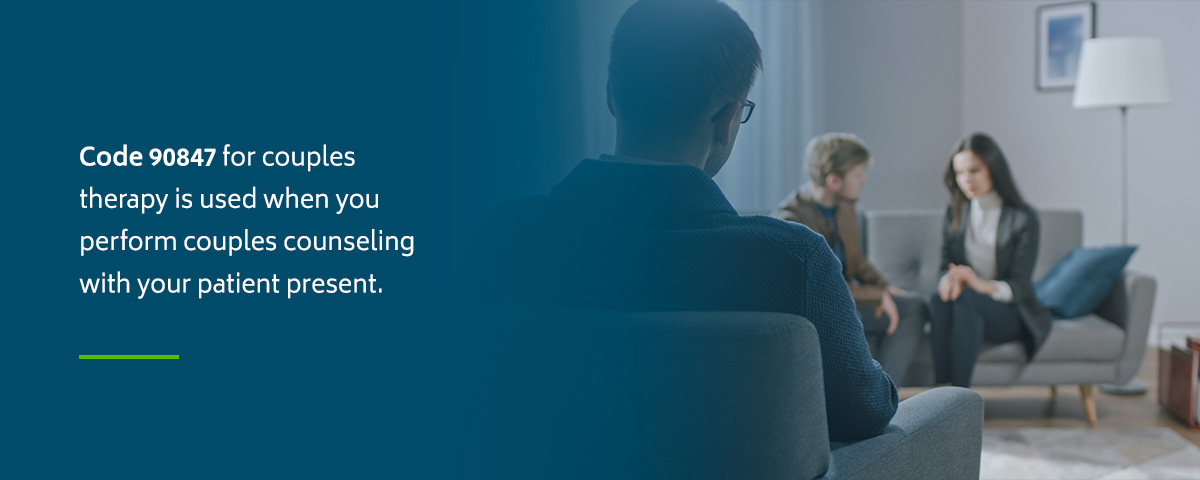Couples Therapy CPT Code and Billing Guide
Billing for couples therapy can be confusing, especially when it comes to selecting the correct CPT code and navigating insurance requirements. Whether you're a new therapist or an experienced provider updating your documentation practices, understanding how to bill for couples therapy is essential to ensure reimbursement and compliance. This guide breaks down the CPT codes most commonly used for couples therapy, explains when and how to use them, and offers practical billing tips to avoid claim denials.

Last Updated: August 18, 2025


What You'll Learn
-
Which CPT codes (90847 and 90846) are appropriate for couples therapy sessions
-
How to determine the identified patient and document medical necessity
-
Key differences between billing individual vs. relationship-focused therapy
-
Tips to avoid common billing errors and insurance denials when submitting claims for couples therapy
Understanding Couples Therapy CPT Codes
What are CPT Codes?
Current Procedural Terminology (CPT) codes are used to identify services provided to patients for insurance reimbursement. In couples therapy, CPT codes help clinicians bill for family or conjoint sessions.
Which CPT Codes Apply to Couples Therapy
-
90847: Family or couples therapy with the patient present
-
90846: Family or couples therapy without the patient present
These codes allow therapists to bill insurance when treating an individual whose care plan involves a partner or family member, assuming coverage criteria are met.
When to Use 90847 vs. 90846
90847 – With Identified Patient Present
Use this code when the identified patient (IP) is present for the session. This is the most common code for couples therapy that supports an individual’s treatment plan.
90846 – Without Identified Patient Present
Use this code when the partner or family member attends a session without the IP, often for the purpose of supporting the IP’s care.
Time Requirements & Add-On Codes
-
Sessions must last at least 26 minutes for 90847/90846
-
Add-on code 99354 can be used for extended sessions after 74 minutes
-
For Medicare, minimum session length is 50 minutes

Want to master your mental health billing process?
Download our complete guide to billing for mental health services
Simplify behavioral health billing, avoid common coding mistakes, reduce claim denials, and get paid faster with this step-by-step guide—perfect for solo clinicians or billing staff.
Billing Best Practices for Couples Therapy
Select the Identified Patient (IP)
Always determine who the IP is before starting couples therapy. This person must:
-
Have a diagnosable condition
-
Appear on the claim
-
Be the focus of documentation
If both partners have diagnoses, select the one with the most severe symptoms or primary insurance holder.
Medical Necessity & Insurance Verification
Couples therapy is often not covered unless:
-
It's part of an individual’s treatment plan for a covered diagnosis
-
Medical necessity is clearly documented
Always verify benefits in advance, especially for Employee Assistance Programs (EAPs), ACA plans, or Medicare.
Avoid Double Billing and Fraud
Never bill both individuals in a couple separately for the same session. This is considered double billing, which is illegal and can lead to license loss.

Handling Dual Coverage
If the IP is covered under two insurance plans:
-
Determine the primary plan
-
Only bill that plan
-
Never submit separate claims to both plans for the same session
Billing Examples & Scenarios
Example 1: IP Present
Becky has been in therapy for depression. Her partner attends sessions to support her. You bill 90847, with Becky listed as the IP.
Example 2: Partner Attends Alone
Becky’s partner meets with you to learn how to support her. You bill 90846, because the IP is not present.
Example 3: Separate Individual Session
You see Becky individually for a 45-minute session. You bill 90834, using her depression diagnosis.
Insurance Coverage for Couples Therapy
Is Couples Therapy Covered by Insurance?
Couples therapy, also referred to as marriage counseling or family therapy, is not automatically covered under most health insurance plans. In fact, many insurers specifically exclude relationship counseling unless it's tied to the treatment of a diagnosable mental health condition.
While laws like the Mental Health Parity and Addiction Equity Act (MHPAEA) and the Affordable Care Act (ACA) mandate that mental health conditions receive equal coverage to physical health conditions, these protections generally do not extend to couples counseling, which is often viewed as a personal growth or relational issue rather than a medical necessity.
Under MHPAEA, insurance providers cannot impose more restrictive limitations or higher co-pays for mental health treatment. However, this protection applies only to services deemed medically necessary, which couples therapy usually is not, unless it supports the treatment of a diagnosed mental health disorder in one partner.
What Qualifies as Medically Necessary Couples Therapy?
Insurance may cover couples therapy if:
-
The session is structured to treat a diagnosed condition in one partner (the identified patient or IP).
-
The presence of the partner supports the clinical goals for the IP’s care (e.g., managing depression, anxiety, substance use, or schizophrenia).
-
The provider can justify the intervention with clear documentation, including treatment plans and session notes.
When do Insurance Exceptions Apply?
There are a few cases where couples counseling may be eligible for coverage:
-
Specific Mental Health Diagnoses: If a condition such as addiction, PTSD, or major depression is placing significant strain on a relationship, and the partner’s involvement is clinically justified, couples therapy might be covered.
-
ACA-Compliant Plans: In rare cases, ACA health insurance plans may cover couples therapy if it directly supports treatment for conditions such as:
-
Drug abuse or alcoholism
-
Mood disorders
-
Schizophrenia
-
-
Medicare Part B: This may cover family counseling, including couples therapy, but only if the treatment improves the functioning of the individual with a diagnosed condition. Restrictions often apply based on provider type and credentialing.
-
Employee Assistance Programs (EAPs): Some employers offer short-term coverage for couples therapy through EAPs. These sessions are often limited in number and may require the couple to use a provider within a specific network.
-
Supplemental Plan Benefits: Some insurance plans offer relationship counseling as an added benefit, but:
-
Clients may need to meet a deductible first.
-
Clients may need to submit claims for reimbursement rather than paying a co-pay.
-
Why Verification is Critical Before Every Couples Session
As a mental health provider, it's essential to:
-
Verify coverage before delivering services involving partners or families.
-
Document medical necessity linking the session to the treatment of a mental health condition.
-
Clarify financial responsibility with clients upfront, especially when services fall outside their benefit plan.
Even when coverage exists, authorization requirements or exclusions can result in denied claims if proper procedures aren’t followed.

Summary & Quick Reference
-
90847: Couples therapy with IP present
-
90846: Couples therapy without IP present
-
Always list only one IP and document medical necessity
-
Never double bill or use CPT codes to “work around” coverage rules
-
Use EHR software (like ICANotes) to streamline accurate documentation and coding
Frequently Asked Questions about Couples Therapy CPT Codes
How ICANotes Improves Billing Documentation for Couples Therapy
Accurate billing for couples therapy requires more than just the correct CPT code—it also depends on clear, compliant documentation that supports medical necessity. That’s where ICANotes comes in.
Our behavioral health EHR simplifies the documentation and billing process for couples therapy with tools designed to help you get reimbursed faster and stay compliant:
-
Pre-configured Couples Therapy Note Template: Our specialized couples therapy template guides clinicians through documenting the identified patient, session goals, and clinically relevant relational dynamics—all essential for justifying CPT code 90847 or 90846.
-
Integrated Diagnosis and Treatment Plan Linking: Tie each session note to the identified patient's diagnosis and treatment plan with just a few clicks, ensuring your claims meet medical necessity requirements.
-
Compliance-Focused Design: Every note is structured to withstand audit scrutiny and meet payer standards, whether you’re billing private insurance, Medicare, or EAPs.
-
Efficient Claim Generation: Quickly generate clean, accurate claims with embedded codes, modifiers, and session details ready to submit.
If you’re spending too much time documenting or second-guessing your billing, it might be time to switch to a smarter solution. ICANotes empowers behavioral health clinicians to focus on care, not coding.
Want to see it in action? Schedule a demo and explore how ICANotes supports streamlined, accurate billing for couples therapy.
Start Your 30-Day Free Trial
Experience the most intuitive, clinically robust EHR designed for behavioral health professionals, built to streamline documentation, improve compliance, and enhance patient care.
- Complete Notes in Minutes - Purpose-built for behavioral health charting
- Always Audit-Ready – Structured documentation that meets payer requirements
- Keep Your Schedule Full – Automated reminders reduce costly no-shows
- Engage Clients Seamlessly – Secure portal for forms, messages, and payments
- HIPAA-Compliant Telehealth built into your workflow
Complete Notes in Minutes – Purpose-built for behavioral health charting
Always Audit-Ready – Structured documentation that meets payer requirements
Keep Your Schedule Full – Automated reminders reduce costly no-shows
Engage Clients Seamlessly – Secure portal for forms, messages, and payments
HIPAA-Compliant Telehealth built into your workflow
Related Posts
Fatima C. Davis is the RCM Manager at ICANotes and a seasoned expert in behavioral health revenue cycle management. With over 20 years of experience, she specializes in optimizing collections, reducing denials, and ensuring compliance across diverse payer landscapes. Fatima has led RCM operations for large multi-agency systems and is passionate about helping behavioral health practices achieve financial sustainability.







